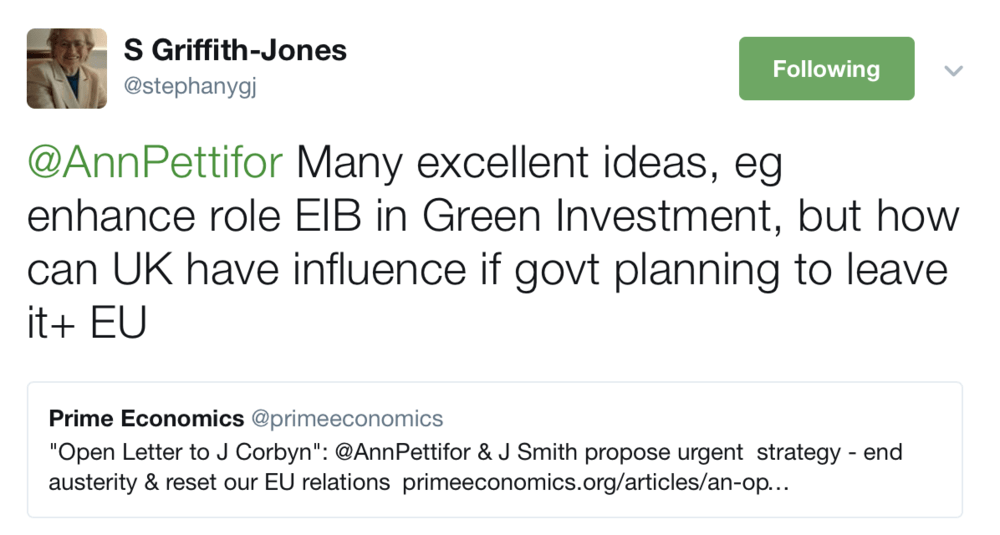Fair question. We of course do not know if our proposed strategy will work. But it does offer more than many people realise – to all sides – in this coming negotiation and discussion. Above all, by potentially extending the negotiating period from the outset, a more realistic time-scale would provide for constructive discussion and negotiation, but also for economic and political reality to take hold. Our proposal is not prescriptive in any way about the outcome. We assume at this point that it would lead to Brexit in some shape or form, but it is quite possible – given how fast political events move – that there could be major shift in public sentiment.
We are in other words, offering a process, not a solution. The process, we believe, would enable a positive rather than a harmful “battle”. Much of what we propose is similar to that outlined by Prof. Ngaire Woods in her recent Project Syndicate post (“A Brexit Strategy for a Weak UK Government”) – a post that we had not seen before outlining our own. Prof. Woods outlines three fundamental errors made by the Conservative government to date:
1) “The first classic mistake made thus far was for the UK government to imagine that it was headed into battle. According to this view, negotiators must obscure their real plans or intentions, as they work to seize a dominant position, and, ultimately, to vanquish their foes… But Brexit is not D-Day. Far from attempting to defeat its enemies the United Kingdom is attempting to preserve mutually beneficial relationships with countries from which it cannot distance itself geographically……”
2) “The second classic negotiating error is to focus exclusively on your own interests…”
3) “The third mistake is to create unrealistic expectations. The Brexit talks will undoubtedly be long and difficult….managing expectations regarding timing may be most important.”
We agree wholeheartedly with Prof. Woods on these three key points. But to have any chance of turning the process from a confrontational negative one, into a co-operative positive one, will not only require not only a change in tone and approach, but also the forging of a broad political alliance which will enable the extraordinarily rich and diverse set of UK-EU networks to be mobilised in support of a mutually beneficial outcome.
One of the crucial errors of the Cameron government before the Referendum was to pull Conservative MEPs out of the European Peoples’ Party which brings together so-called centre-Right conservative parties. Labour, Lib Dem, Green and SNP MEPs, on the other hand, are active members of their European political groupings, and could play a very strong role in the new approach.
Of course, they will only be listened to if it does not look as if the UK is trying to have “its Brexit cake and eat it”. That is why it is so important that Labour and its allies insist that UK negotiators give assurances from the outset of
a) a guarantee that EU citizens resident in the UK would enjoy full rights, and
b) a commitment in principle to make reasonable financial contributions that fairly reflect the future benefits of cooperation in the mutual interest.
Conclusion
We don’t know whether our approach will work. It depends on a lot of people, especially in Britain but also in EU circles adopting a very different mindset. We think that our approach is rational and feasible, but there is every risk that, in the short time available, we will end up with anger, recriminations and dangerous new geopolitical alliances. That is why it is so urgent and important for Labour’s leaders to seize the initiative in a strong and positive way – and to fill the vacuum left by the May government’s abysmal lack of statesmanship.







One Response
As concern about the NHS was apparently the key issue that determined how people voted last week, it is vital that antagonistic Brexit negotiations do not drive Britain into a desperate rush to conclude a free trade agreement with the United States. Why? – because that would, almost certainly, enable huge American corporations to take over the profitable sections of the NHS and to sue our government for loss of future profits if there was any decision not to renew their contracts. In other words, privatisation of the NHS would be irreversible.
Hilary Saunders (Bristol)